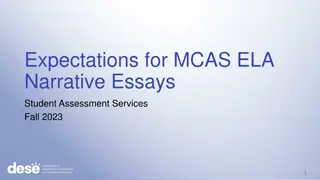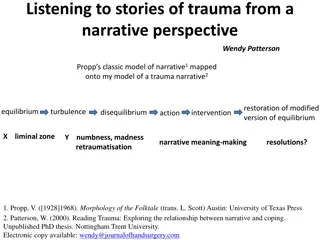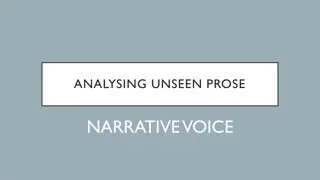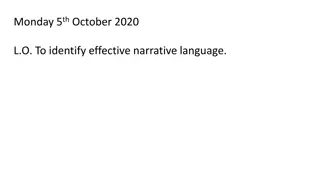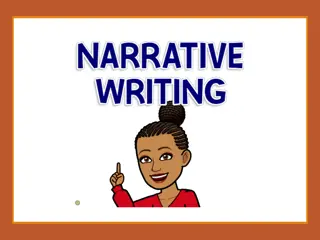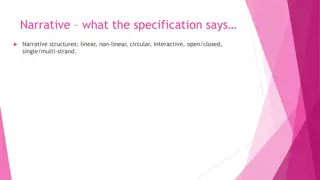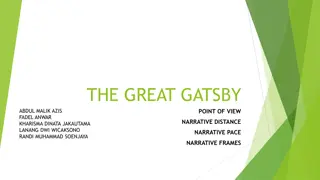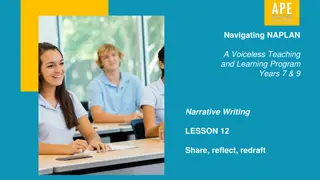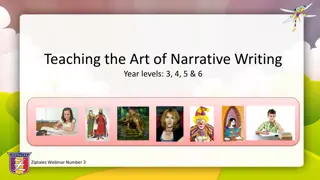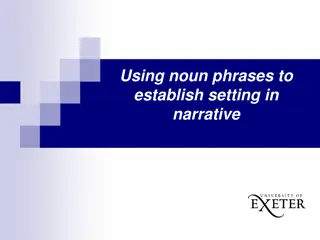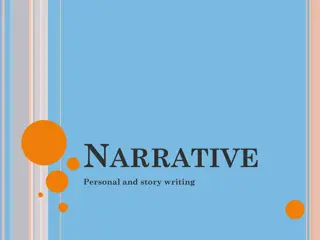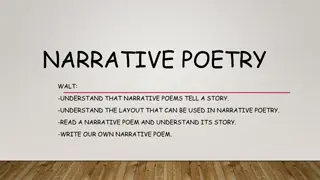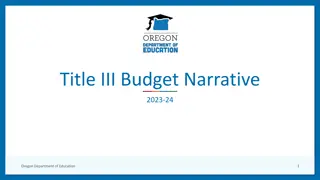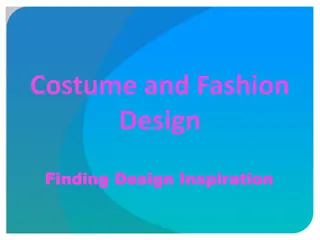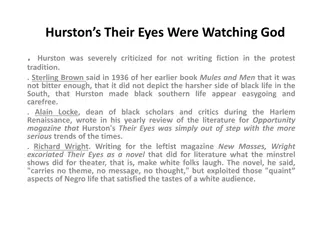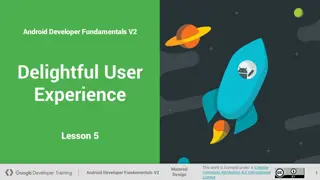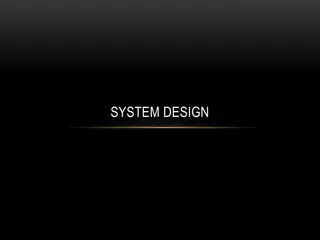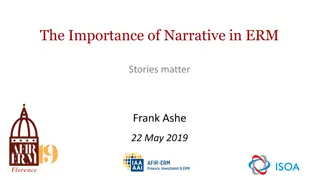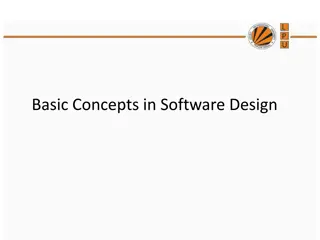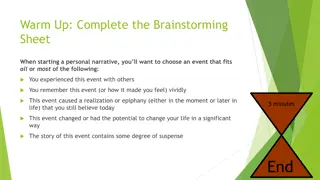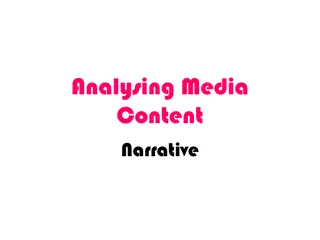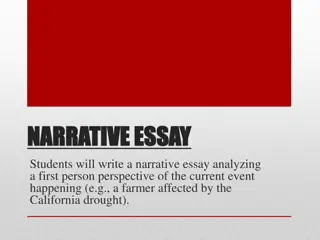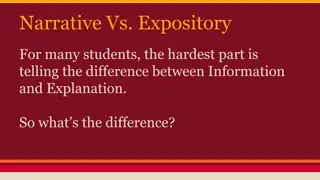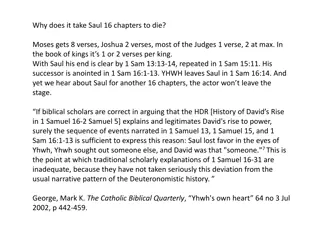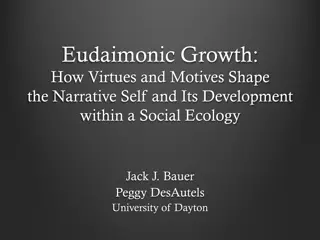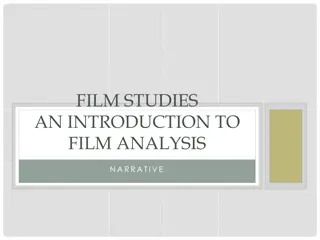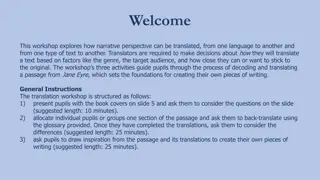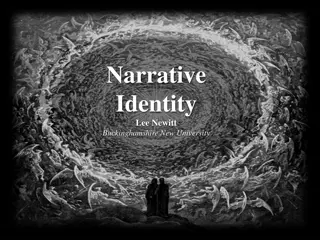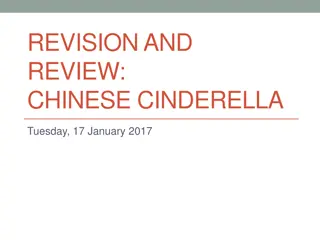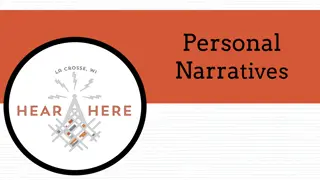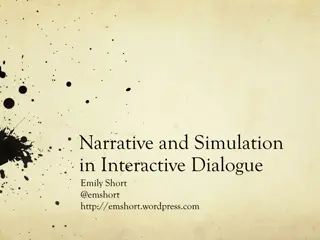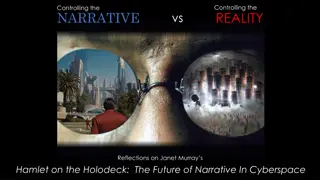MCAS ELA Narrative Essay Expectations and Examples
Learn about the expectations for MCAS ELA narrative essays, including guidelines for idea development and conventions. Find out how to score well by responding in the correct writing mode and avoiding common mistakes. Explore examples of lower-score responses and how to improve them. Download sample
3 views • 10 slides
Understanding Trauma Narratives: A Narrative Perspective
Exploring trauma narratives through the lens of Wendy Patterson Propp's classic narrative model, this study delves into the restoration of equilibrium, the disruption of disequilibrium, and the intervention actions within the liminal zones of trauma narratives. It emphasizes narrative meaning-making
5 views • 5 slides
Understanding Narrative Perspective in Unseen Prose Narratives
Explore the narrative voice in unseen prose narratives through the analysis of different narrative perspectives, such as homodiegetic and heterodiegetic narrators. Understanding these terms helps in interpreting the impact of perspective on storytelling and themes in literary texts for exam preparat
1 views • 17 slides
Exploring Effective Narrative Language for Writing Success
Delve into the art of crafting compelling narratives by identifying and utilizing effective narrative language techniques. Explore the elements that make a good narrative, practice identifying literary techniques, and understand the impact of figurative language on storytelling. Enhance your writing
0 views • 42 slides
Exercise in Narrative Style Transformation
Practice transforming narrative styles in storytelling through a series of examples where dialogues are rewritten into narratives. The exercises focus on changing direct speech into indirect speech while maintaining the essence of the original conversations. Each task presents a scenario followed by
1 views • 26 slides
Mastering Narrative Writing: Techniques and Sequences
Enhance your narrative writing skills by engaging readers with compelling characters and settings, developing well-structured event sequences, and utilizing descriptive details and narrative techniques effectively. Explore different points of view and learn to create engaging narratives that captiva
1 views • 23 slides
Understanding Narrative Research Design in Qualitative Research
Narrative research is a qualitative research approach that focuses on sharing individuals' stories. Researchers collect and interpret personal narratives to understand individual experiences. Key characteristics, data collection methods, steps, and ethical considerations in narrative research are ex
0 views • 20 slides
Understanding Narrative Structures in Media: Linear vs. Non-Linear
Explore the concepts of linear and non-linear narrative structures in media storytelling, analyzing how they are used to engage audiences effectively. Dive into well-known stories like Alice in Wonderland, Hansel and Gretel, and Jack and the Beanstalk to understand the difference between narrative a
0 views • 17 slides
Understanding Narrative Elements in "The Great Gatsby
Explore the narrative elements in "The Great Gatsby" such as point of view, narrative distance, and narrative pace. The novel is analyzed from chapters 5 to 9, focusing on Nick Carraway's first-person perspective and the small narrative distance, which adds realism to the story.
0 views • 11 slides
Understanding Narrative Techniques for Effective Storytelling
Explore different narrative techniques like first-person perspective, flashback, framed narrative, foreshadowing, and in medias res to enhance your storytelling skills. Learn how these techniques can bring depth and complexity to your narratives, captivating your audience with engaging storytelling
3 views • 13 slides
Understanding the Art of the Short Story
A short story is a concise narrative that captivates readers with a focused theme and structured plot. This literary form demands unity of purpose and a single informing idea, distinguishing it from a novel. Various perspectives exist on the composition of a short story, with debates on its length,
1 views • 10 slides
Software Engineering Design Principles and Concepts
The chapter discusses the essential principles and concepts in software design, highlighting the four key design models - data design, architectural design, interface design, and component-level design. It emphasizes the importance of traceability to the analysis model, minimizing the gap between so
0 views • 36 slides
NAPLAN Year 7 & 9 Narrative Writing Lesson: Share, Reflect, Redraft
Explore a voiceless teaching program for NAPLAN Years 7 & 9 narrative writing in Lesson 12. Dive into assessment criteria, NAPLAN minimum standards for Year 7 and 9, and resources from the National Assessment Program. Enhance your narrative writing skills through sharing, reflection, and redrafting.
0 views • 5 slides
Mastering Narrative Writing: Tips for Year Levels 3-6
Dive into the art of narrative writing focusing on Year Levels 3 to 6. Explore the importance of narratives in children's lives, the inclusion of narrative in the Australian Curriculum, understanding what truly constitutes a story, and engaging activities to spark creativity in students.
0 views • 25 slides
Understanding Narrative Stories and Plot Structure
A narrative text is a story composed of various elements such as characters, setting, conflict, events, climax, and resolution. The structure of a narrative story can be dissected into parts like beginning, middle, and end, each serving a specific purpose in storytelling. By plotting the story on a
0 views • 13 slides
Exploring Setting Through Noun Phrases in Narrative Descriptions
Establishing setting in narrative through the use of descriptive noun phrases is crucial for creating a vivid and immersive atmosphere. By carefully selecting and arranging nouns, authors can evoke specific moods and engage readers in a detailed visual experience. This approach enhances the overall
1 views • 6 slides
Intriguing Narrative Journey
The session explores narrative writing, correcting sentences into past tense, discussing opening lines, successful narrative ingredients, and a gripping excerpt. Engage with the power of storytelling and honing writing skills through creative challenges and analysis.
0 views • 73 slides
Mastering Narrative Writing: Techniques and Tips
Dive into the world of narrative writing with this comprehensive guide! Learn the nuances of crafting fictional and personal stories, explore dialogue techniques, understand the structure of a narrative, and enhance your writing with impactful vocabulary. Whether you're a beginner or seeking to refi
0 views • 20 slides
Dive into Narrative Poetry
Explore the essence of narrative poetry by understanding its storytelling nature, layout, features, and common poetry techniques. Delve into an example poem, "Skippy the Naughty Kangaroo," to grasp the main characters, narrative elements, and the story it conveys. Through this journey, you'll enhanc
0 views • 11 slides
Budget Narrative for Title III Grants in Oregon Education 2023-24
This budget narrative outlines the goals of Title III grants for the Oregon Department of Education, focusing on aiding English learners in attaining language proficiency and academic achievement. It emphasizes the importance of Supplement not Supplant regulations to ensure proper fund allocation an
0 views • 38 slides
Exploring Design Inspiration and Elements in Costume and Fashion Design
Dive into the world of costume and fashion design through a visual journey of finding design inspiration, understanding the design process, emphasizing originality, and exploring different sources of creativity. Discover how technology, art, food, history, architecture, and nature can spark innovati
0 views • 45 slides
The Complexity of Narrative Voices in "Their Eyes Were Watching God
Zora Neale Hurston's novel "Their Eyes Were Watching God" faced criticism for not conforming to traditional protest literature styles. The narrative features a compelling protagonist, Janie Crawford, who defies stereotypes of black women in literature. Hurston skillfully employs a dual narrative sty
0 views • 8 slides
Material Design: Combining Classic Design Principles with Technological Innovation
Material Design is a design language that combines traditional design principles with the possibilities offered by technology and science. It emphasizes visual language, classic design elements, and innovation to create delightful user experiences. The Material Metaphor, Imagery, Typography, Color,
0 views • 34 slides
Comprehensive Guide to System Design Components and Techniques
System design involves the detailed planning and identification of components in an information system, aiming to provide users with a general understanding of the new system. This process includes techniques like flowcharts, prototyping, and component design, covering aspects such as output design,
0 views • 24 slides
The Power of Narrative in ERM and Economics
Narrative plays a crucial role in risk management, as it helps in better understanding and decision-making. The use of stories in risk dashboards and economic narratives can convey complex information effectively. Robert Shiller's concept of narrative economics explores how popular stories impact ec
0 views • 27 slides
Understanding Basic Concepts in Software Design
Software design involves transforming customer requirements into a form suitable for implementation, with activities categorized into preliminary and detailed design stages. High-level design focuses on module identification and control relationships, while detailed design entails defining data stru
1 views • 24 slides
Personal Narrative Brainstorming for Engaging Storytelling
Start your personal narrative journey by selecting an event that resonates with significant aspects of personal experience and emotional impact. Explore shared experiences, vivid memories, realizations, potential life-changing moments, and elements of suspense to craft a compelling story. Engage in
0 views • 26 slides
Engaging Narrative Writing Challenges for Year Six Students
Delve into a captivating narrative featuring Louisa, Miss Larkin, and Mr. Spencer. Explore the use of figurative language, relative clauses, and emotive language in a mysterious and dramatic setting. Follow the challenges outlined to enhance your storytelling skills with similes, personification, me
0 views • 6 slides
Understanding Narrative Structures in Media Content
Narrative in media content involves how stories are told, focusing on structure and conventions. Key elements include Todorov's narrative theory, basic narrative structures, and Propp's character spheres of action, all of which shape the way stories unfold in films and other media.
0 views • 13 slides
Crafting a First-Person Perspective Narrative Essay
Explore the art of crafting a narrative essay from a first-person perspective, delving into the essence of storytelling through vivid details and character reflections on current events. Learn narrative techniques and guidelines for structuring compelling narratives, all through the lens of personal
0 views • 31 slides
Understanding the Difference Between Narrative and Expository Writing
Differentiating between narrative and expository writing can be challenging for many students. This content explores the distinctions between narrative stories like "Little Red Riding Hood" and expository pieces, touching on concepts such as the shapes of stories and the structure of essays. Quotes
0 views • 8 slides
Saul's Prolonged Narrative in 1 Samuel: A Deviation Explained
Exploring the extended narrative of Saul in the book of 1 Samuel compared to other biblical figures, this analysis delves into the theological and narrative reasons behind Saul's prolonged story. It examines the implications of Yhwh's abandonment of Saul and the emergence of David as the chosen one,
0 views • 8 slides
Understanding Eudaimonic Growth and the Narrative Self
Delve into how virtues and motives influence the development of the narrative self within a social context. Explore the interplay between eudaimonic values, virtues, and the impact of families and social institutions on personal growth. Discover the significance of narrative self-construction in sha
0 views • 23 slides
Exploring Narrative in Film Studies: An Introduction to Film Analysis
Shots in film and television are crucial in storytelling, forming the narrative that can be dissected into plot and discourse. The plot revolves around events and character development, while discourse focuses on how the story is conveyed. Narrative theory, highlighted by Propp's character roles, pr
1 views • 11 slides
Exploring Narrative Perspective in Translating Jane Eyre Workshop
This workshop delves into the translation of narrative perspective, guiding participants through decoding and translating a passage from Jane Eyre. Activities include analyzing book covers, back-translating passages, and creating inspired pieces of writing. Participants explore how translators make
0 views • 18 slides
Exploring Narrative Identity Through Various Perspectives
This collection delves into the concept of narrative identity from multiple viewpoints, encompassing discussions on individuals like Lee Newitt, Dante Alighieri, and insights on pilgrimage, landscapes, self-potentiality, life stories, and narrative therapy by theorists such as McAdams, Hermans, and
0 views • 14 slides
Analysis of Structure and Form in Chinese Cinderella
Explore the internal organization and prose style of the text "Chinese Cinderella" through an examination of structure, narrative form, dialogue usage, and character development. Dive into how the sections are divided, the use of dialogue to define characters, and the indicators that stand out in th
0 views • 6 slides
Crafting Compelling Personal Narratives: A Roadmap to Storytelling
Explore the elements of a good narrative, learn from a real example with Hunter Wagner's story, and discover how to choose, set up, and share your own personal narrative using the provided lesson roadmap and narrative organizer.
0 views • 21 slides
Exploring Narrative and Simulation in Interactive Dialogue
In this discussion, Emily Short delves into the convergence of narrative and simulation within interactive dialogue, emphasizing goals like explorability, expressiveness, pacing, and character agency. The design focuses on player freedom in dialogue interactions while maintaining a compelling narrat
0 views • 51 slides
Exploring Janet Murray's Vision of Narrative Evolution in Cyberspace
Janet Murray's book "Hamlet on the Holodeck: The Future of Narrative In Cyberspace" delves into the shift towards interactive storytelling in modern media like video games and Virtual Reality. She emphasizes the role of interactivity, immersion, and freedom in shaping narratives, offering a new form
0 views • 16 slides
